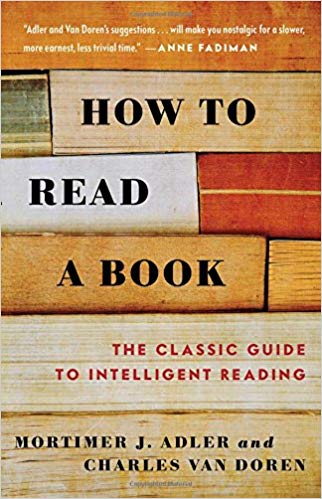A Brief Book Summary from Books At a Glance
By Benjamin J. Montoya
About the Authors:
Mortimer J. Adler was Chairman of the Board of the Encyclopedia Britannica, Director of the Institute for Philosophical Research, Honorary Trustee of the Aspen Institute, and authored more than fifty books. He died in 2001.
Charles Van Doren earned advanced degrees in both literature and mathematics from Columbia University, where he later taught English and was the Assistant Director of the Institute for Philosophical Research. He also worked for Encyclopedia Britannica in Chicago.
Introduction
It may seem odd to find a summary of a book on how to read a book on a website full of book summaries, reviews, book notices, and much more. But this book is perhaps among the most important of books we offer a summary of because it is essential to the overall book-reading enterprise.
Table of Contents
Part One The Dimensions of Reading
Chapter 1 The Activity and Art of Reading
Chapter 2 The Levels of Reading
Chapter 3 The First Level of Reading: Elementary Reading
Chapter 4 The Second Level of Reding: Inspectional Reading
Chapter 5 How to Be a Demanding Reader
Part Two The Third Level of Reading: Analytical Reading
Chapter 6 Pigeonholing a Book
Chapter 7 X-raying a Book
Chapter 8 Coming to Terms with an Author
Chapter 9 Determining an Author’s Message
Chapter 10 Criticizing a Book Fairly
Chapter 11 Agreeing or Disagreeing with an Author
Chapter 12 Aids to Reading
Part Three Approaches to Different Kinds of Reading Matter
Chapter 13 How to Read Practical Books
Chapter 14 How to Read Imaginative Literature
Chapter 15 Suggestions for Reading Stories, Plays, and Poems
Chapter 16 How to Read History
Chapter 17 How to Read Science and Mathematics
Chapter 18 How to Read Philosophy
Chapter 19 How to Read Social Science
Part Four
Chapter 20 The Fourth Level of Reading: Syntopical Reading
Chapter 21 Reading and Growing of the Mind
Summary
Part One: The Dimensions of Reading
Chapter 1: The Activity and Art of Reading
Some of us read so often that it may be odd for us to stop and consider the activity and art of reading, a meta-reading reflection. Reading is something that we do to gain information. But it differs from other ways of gathering information. If we listen to a speaker, we can ask that person questions that they may or may not answer. Reading is not so simple. If we have a question about a book, we have to find that answer ourselves.
Furthermore, when it comes to reading, how we understand something is different from other things. If someone throws us a ball, we can catch it. That action is complete. But reading is not so simple. People can “catch” only part of it, or they misunderstand part of it. That is why a more intelligent approach to reading is required.
The overall approach to reading advocated in this book can be characterized as active reading. It is an approach that must account for the different levels of reading, the subject of chapter two.
Chapter 2: The Levels of Reading
There are different levels of reading to keep in mind. We are probably more familiar with this concept than we think. We read newspapers and social media differently than we do books—and we often do it instinctively. What, then, are the levels? This chapter will introduce and explain each level briefly and the following chapters will focus more on each level.
The first level of reading is elementary reading. This question asks a simple question, “What does this sentence say?” This question can, of course, become overly complex, but that is not the sense in which it is used here. This kind of reading refers to the basic kind of reading someone hopefully learns in elementary/primary school.
[To continue reading this summary, please see below....]The remainder of this article is premium content. Become a member to continue reading.
Already have an account? Sign In
